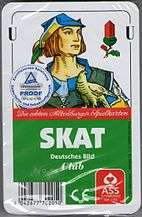Bierlachs
Bierlachs, also Bierskat or Lachs, is a variant of Germany's national card game, Skat, that is predominantly played for beer in pubs and restaurants.[1][2][3]
 A typical Skat pack (German-suited cards) | |
| Origin | Germany |
|---|---|
| Alternative names | Bierlatz |
| Type | Trick-taking |
| Players | 3 |
| Skills required | Hand evaluation, counting, cooperation |
| Cards | 32 |
| Deck | French or German-suited "Skat" pack |
| Play | Clockwise |
| Card rank (highest first) | (U/J) A 10 K O/Q 9 8 7 |
| Playing time | 3–5 minutes per hand played |
| Random chance | Low |
| Related games | |
| Skat | |
Name
The name is a corruption of Bierlatz; latzen is colloquial German for "paying" e.g. a fine[4] and alludes to the fact that the loser pays for a round of beer.[5]
History
The game is recorded as Bierlachs or Lachs as early as 1862 where, depending on the beverage being played for, it was also referred to as Weinlachs ("Wine Round") or Kaffeelachs ("Coffee Round").[6]
Rules
The following rules are based on Lehnhoff except where stated.[1]
Bierlachs follows the general rules for Skat, except in terms of scoring and winning. A target score is set and only minus scores are reckoned. In other words, if the declarer wins a deal worth 40 points, the two opponents score the minus 40 points each. If the declarer loses such a game, he is penalised double (as in Skat) and scores minus 80 points.[7]
The game is played until one of the players reaches the (minus) target; he is the loser and pays for a round of beer, hence the name "Bierlachs". Sometimes a fixed payment is made to the Skatkasse, also called the Pinke,[7] i.e. Skat pot.
Game is typically 501 points.
Tactics
A player nearing the target score is forced to try to win the auction in order not to collect any more minus points. This often leads to a willingness to take ever more risk, sometimes resulting in desperate games being played.[7] However, a player in the danger zone will also find that their opponents are increasingly risk-averse and reluctant to bid. This may present a chance to draw an opponent into the danger zone as well. But if an opponent wins, the endangered player is likely to be pushed over the limit and thus lose the game. As Lehnhoff suggests, such a game is not without its appeal and it can be exciting to see someone in the danger zone snatch victory from the jaws of defeat or a relief to survive and see one's "Skat brother go for a swim". There is usually a moral obligation to play another game to allow the loser to enjoy a free beer. When a Bierlachs session ends is a matter for agreement but, typically, when one or more players decide they need to go, they will announce the last three deals. These are usually played as Bock rounds, in which the game value doubles, giving the player who is losing a chance to catch up.[1]
Variations
Games may also be played for 301 or 401 points. It is common to add the date of the month to the target, for example:[7]
- 300 + date: on the 19th of the month, the target score would be 319.
- 500 + date: on the 11th of the month, the target would be 511 points.
- 300 + player's age: if the player is 33, the target would be 333 points.
Although the normal penalty is a round of beer for the 3 or 4 players, sometimes it is agreed that the loser buys lunch or supper.
- 3 Bock - 3 Ramsch: three Bock hands then three Ramsch hands are played alternately (for four-hand games, obviously 4 x Bock and 4 x Ramsch).
- Bock as special game if: the result is 60:60 or game value is over 120 points
See also
References
- Lehnhoff 2011, pp. 124–126.
- Einführung in das Skat Archived 5 January 2019 at the Wayback Machine by Stan Baumann at www.skatroid.com. Retrieved 4 January 2019
- Skatbegriffe at www.muerlenbach.de. Retrieved 6 February 2019
- latzen at Duden. Retrieved 17 December 2018.
- Skat-Geschichten - Bierlachs at zwar-do-brackel.de. Retrieved 4 January 2019
- _ 1862, pp. 11/12.
- Rouselle 2015, p. 31.
Literature
- _ (1862), Freiberger Bier-Comment, Engelhardt, Leipzig.
- Lehnhoff, Karl (1995). Das Skatspiel. Eine Einführung (= Falken TaschenBuch 60151). Falken Taschenbuch-Verlag, Niedernhausen/Ts., ISBN 3-635-60151-9 (several editions).
- Lehnhoff, Karl (2011). Skat: Regeln und Tipps. Für Anfänger und Fortgeschrittene. Mit Skat-Lexikon. 18th, updated, edition. Humboldt, Hanover. ISBN 978-3-86910-178-1
- Rousselle, Hans-Peter (2015). Das Skatspiel in Theorie und Praxis, BoD, p. 31. ISBN 978-3-73573-969-8
External links
| Look up de:Bierlachs in Wiktionary, the free dictionary. |
- Einführung in das Skat ("Introduction to Skat") by Stan Baumann. (pdf)